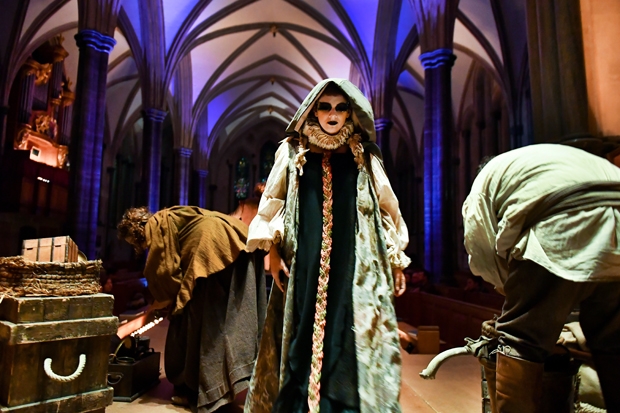When Mozart was commissioned to write an opera for the coronation of Emperor Leopold II, he produced La clemenza di Tito: a hymn to the benevolence of a Roman despot. When Matt Rogers and Sally O’Reilly were commissioned by the Inner Temple, they came up with an opera in which the protagonist is a law student who tries to obstruct the emergency services. The Fire of London is spreading, you say. And the only way to save life and property is by creating firebreaks? Sorry, I think you’ll find that, under Section 15 (4) of the Irresponsible Pettifogging Jobsworth Act 1661, you can’t do that. Truly, an operatic hero for our time. As the lights of the surrounding legal chambers shone into the Temple Church, I swear I heard the smartly dressed crowd in the pews around me purring quietly with approval.
And fair enough. He who pays the piper, and all that. It’s actually pretty heartening that in 2016 a community of lawyers should commission an opera to commemorate the great fire. The result, And London Burned, fulfilled its brief with striking musical originality and considerable visual flair, even if — for all the efforts of a fresh-voiced professional cast — that short, futile legal squabble was almost the sole moment of human drama. The Law Student (Alessandro Fisher) wasn’t even given a name, although Dryden and the Duke of York (Andrew Rupp in both roles) made fleeting appearances, and the soprano Raphaela Papadakis stalked the scene as an allegorical personification of London, initially in the light-studded robes of the modern city and later stripped of her finery as the fire progressed.
That was the giveaway: this wasn’t really an opera, but a pageant, a masque. As such, the artificiality of O’Reilly’s libretto was perfectly appropriate, weaving in bits of 17th-century texts to give an agreeably Pepys-ish flavour. It looked good, too. Lit in half-shades from below, the atmosphere of the darkened church did the rest, and director Sinéad O’Neill made imaginative use of the space — characters declaiming from the pulpit; lovers glimpsed embracing in an archway; the Law Student’s shadow thrown by candlelight against wood panels.
So did Rogers, whose grungy, charcoal-shaded score — conducted with impressive clarity by Christopher Stark — set an ensemble of cellos, clarinets and horns against the looming, air-shaking rumble of the church’s organ, and gave momentum to the essentially drama-free plot. When in the final moments it resolved into an actual 17th-century organ voluntary by Matthew Locke, you felt a momentary urge to join in and sing. And if that response was more appropriate to a church cantata than to an opera, it just went to show how successfully Rogers and O’Reilly had created a work that belonged to this venue and this occasion. It’s hard to see And London Burned having much of an afterlife; still, the sheer creative effort that had been broughtto bear on this pièce d’occasion commanded respect.

Jane Eyre
John Joubert’s opera Jane Eyre has had an altogether unhappier time of it — so far, anyway. Completed in 1997, it has only now been heard in full, in a concert performance by the English Symphony Orchestra under Kenneth Woods that doubled as a recording session. Joubert and his librettist Kenneth Birkin have taken the Eugene Onegin approach, extracting six key scenes from a well-loved novel and going straight for their emotional heart. Some critics have grumbled about a lack of narrative continuity; I couldn’t feel it myself, and Joubert’s luminous, ardently lyrical score (think Britten without his splinter of ice) is disarmingly direct. David Stout made a suitably brusque and Byronic Rochester, but it was April Fredrick as Jane who really carried the whole thing. Whether flashing with defiance or soaring rapturously and with radiant tone over a surging orchestra, she looked — and sounded — as if she needed to be on stage. Jane Eyre itself certainly does.
At the end of the performance the audience rose and, applauding, turned to the 89-year old Joubert. I was left with the unhappy thought that this one-off outing in a suburban school hall was in all probability the only time that the composer will get to hear his vital, warm-blooded creation performed live. We tut disapprovingly at the way Victorian Britain forced its composers on to a treadmill of oratorios. But in Joubert we’ve taken a born musical dramatist and pigeonholed him as a composer of Christmas carols. Barring a David Pountney or a James Conway throwing the resources of a national opera company behind it, the odds of Jane Eyre receiving the full professional staging it begs for are vanishingly small. And there’d still be the problem of attracting an audience that’s long since learned to run a mile from an unfamiliar name. This, reader, is why we can’t have nice things.






Comments